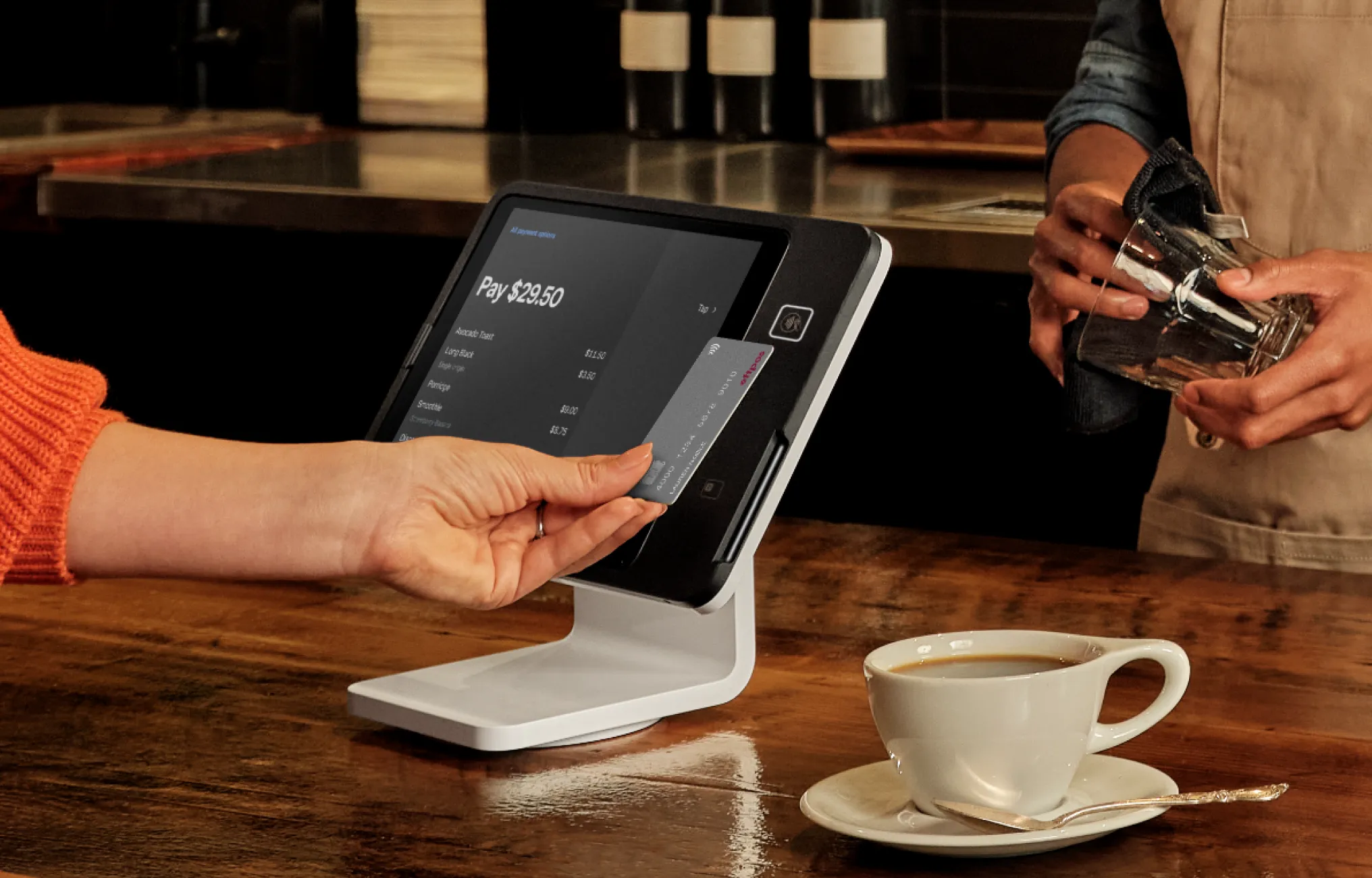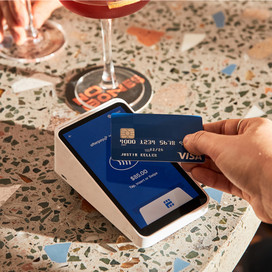Table of contents
Card processing fees are costs that a merchant pays for each credit or debit card sale. These fees are predetermined by your merchant services provider and can include various components such as interchange fees, assessment fees, the payment processor’s markup and other related costs.
Who decides on credit card processing fees?
Credit card processing fees are set by several entities involved in the payment process and generally include three parties: the card issuer, the card network and the payment processor.
- Card issuer: The card issuer is the bank or financial institution that issues cards directly to consumers. CommBank, ANZ, NAB and Westpac are examples of card issuers. For each card transaction, the card issuer charges the merchant a fee for accepting the card, usually a percentage of the transaction amount or a flat fee.
- Card network: The card issuer partners with a card network such as Visa, Mastercard, American Express, eftpos and JCB. These card networks set the rules for assessment fees (which are fees charged by the card networks themselves) and interchange fees (which are paid to the card issuers).
- Payment processor: The payment processor is the financial institution that works in the background to process and complete a credit or debit card transaction. To facilitate all of this, payment processors usually have partnerships with other companies or brands that work directly with consumers and merchants. They typically charge a percentage of the transaction amount plus a flat fee for each credit or debit card purchase.
What goes into typical credit card processing fees?
When it’s all said and done, the average cost of processing card transactions for Australian businesses typically ranges from 1% to 2% per transaction for debit cards and 1.5% to 3% for credit cards. This overall cost is known as the merchant discount rate.
The merchant discount rate includes several fees that payment service providers charge merchants to facilitate card transactions, such as interchange fees, assessment fees and payment processor fees (which we’ll go into below) – all of which go toward ensuring a swift and accurate transaction.
Other potential costs include PCI-compliance fees, annual account fees and chargeback fees (which we’ll also go into later). Such additional charges can often make the real cost of accepting credit cards higher than it initially appears, especially if there are any hidden fees or contracts involved. So, it’s important to educate yourself before deciding how you’ll process card payments at your business.
Note that Square has competitive, transparent pricing, so you know exactly how much you’re paying to process credit and debit cards.
- For in-person payments such as contactless and chip + PIN, it’s a simple rate of 1.6% per transaction.
- For manually entered or card-not-present payments (such as Square Online, eCommerce API, Invoices or Virtual Terminal), a simple rate of 2.2% applies.
There are no monthly or hidden fees or long-term contracts. PCI compliance, customer support and fraud prevention are included in these rates, too. Learn about specific fee information with Square here.
Another benefit of using Square is that we charge the same rate for all major credit and debit cards, including American Express. That way, you can accept any payment method your customers prefer – all for the same simple rate. With other POS solutions, you’ll find that card processing fees can vary from card to card.
Credit and debit card fees that affect rates
Interchange fees
Every time a customer pays with a credit or debit card, a fee is paid from the acquiring bank (merchant account) to the issuing bank (customer account), known as an interchange fee.
Interchange fees are set by card networks (like Visa and Mastercard) and are designed to help the card-issuing bank cover costs associated with the risk of approving the sale, fraud and handling costs. So, it shouldn’t be surprising that the factors influencing these rates relate to how much risk the card issuer takes on.
These risks include:
- The card that’s used: Debit cards with PINs are lower risk than credit cards, so they typically have a lower interchange rate. Premium cards, rewards cards (travel and frequent flyer points etc.) and business cards usually have higher interchange rates.
- How the transaction is processed: Card-present (in-person) transactions at the point of sale (POS) typically have lower rates compared to card-not-present transactions (online, over-the-phone, invoice, or mail-order payments).
- The amount being charged: Merchants with small transaction sizes and high sales volumes may qualify for lower interchange rates to help reduce their costs.
- The type of business: Every business that accepts credit card payments is assigned a merchant category code (MCC) by the acquiring bank or institution. The MCC is a four-digit number used to classify businesses into categories that help determine applicable fees, manage compliance and simplify reporting. It also influences how much a bank or institution charges in interchange fees. Business types considered ‘higher risk’ (like financial services, travel, gambling and hospitality) often have to pay higher interchange fees.
Note that American Express serves as both the card network and the card issuer, and its fee structure varies from the interchange fees we’ve talked about. But if you use Square, the same processing fee will apply for all major credit cards, including American Express.
Assessment fees
Payment processors also collect assessment fees for card networks. These fees are paid directly to the card networks for the use of their card brands and the ability to process transactions through their payment networks.
Assessment fees are different from interchange fees in that they’re charged based on total monthly sales rather than individual transactions, and they’re typically lower. The amount you pay varies by network and depends on factors like whether credit or debit cards were used, transaction volume, and whether foreign transactions were processed.
Card networks review their assessment fees regularly – you can check your monthly credit card statement to see if there are changes to your assessment fee.
Payment processor fees
A payment processing fee is what you pay your card processor for using its product. Typically, this fee is charged per transaction and may involve hidden and monthly fees.
Square doesn’t have monthly or hidden fees, and it has the same processing fee for all major credit and debit cards: 1.6% per tap or insert, and 2.2% for each invoice, online, card-not-present or manually entered transaction.
Our flat payment processing fee covers any interchange fees, assessment fees or other fees that come from processing cards such as American Express.
Other miscellaneous credit card fees and costs you might be paying
While credit card processing fees are a regular business expense, you might encounter other less obvious costs that can impact your bottom line. Here are some other fees to be aware of:
| Type of fees | What is it? | Square’s fee |
|---|---|---|
| Payment gateway fee | The service fee for transferring money between your merchant account and your payment processor | No additional or add-on fees |
| PCI compliance fee | The fee for maintaining compliance with security standards to protect card information. All businesses that accept credit cards must comply with this standard | No additional or add-on fees |
| Chargeback fee | The fee charged when a customer disputes a charge and requests a reversal | No additional or add-on fees |
| POS software fee | The monthly fee for using your point-of-sale (POS) software (also known as monthly SaaS fee) | No additional or add-on fees |
| POS hardware rental fee | The monthly cost for renting your POS terminal hardware and other associated accessories | N/A |
| Batch fee | The fee for settling or closing out your deposits each day (also known as batch header fees) | No additional or add-on fees |
| Hosting fee | Fee charged for traditional server-based POS systems | N/A |
| Wireless access fee | The fee for using a cloud-based POS terminal instead of a traditional phone line | No additional or add-on fees |
| Address verification system (AVS) fee | The fee charged per transaction for manually entered payments to verify that the customer’s billing information matches the card on file | No additional or add-on fees |
| Monthly statement / support / service fee | The flat monthly fee charged by some payment processors for support-related services, including preparing and mailing monthly statements and general customer support | No additional or add-on fees |
| Monthly minimum fee | The fee charged if your monthly gross payment volume (card dollars processed) falls below a set amount | No additional or add-on fees |
How can you reduce credit and debit card transaction fees?
Here are a few ways to help you manage and reduce your card transaction fees:
Accept cards in person when possible
Online, manually entered, invoiced or mail-order transactions (also known as card-not-present or CNP transactions) have higher processing fees than in-person (POS) transactions because they’re more susceptible to fraud. Try to accept cards in person whenever possible if it makes sense for your business.
Reduce your risks of chargebacks
If your business incurs a lot of chargebacks (when a customer disputes a charge from your business and asks the card issuer to reverse it), banks consider you a higher risk and may hike up processing fees. So, it’s important to take steps to reduce your chargeback risk.
There are several simple ways to minimise chargebacks, but one of the most effective is to use a credit card authorisation form. This is a document the customer signs to give you permission to charge their card on an ongoing basis. With this document in place, your chances of winning a chargeback case with the card issuer are much more likely (not to mention less complicated). There are specific preventative actions you can also take to minimise the occurrence of chargebacks if you are a restauranteur or retailer.
Note that with Square, there’s just one flat fee for CNP transactions and another simple flat fee for in-person transactions – so you don’t need to worry about getting charged a higher rate.
Require a minimum amount for credit card sales
To offset processing fees, some businesses (especially those that tend to handle smaller transactions, for example, cafes or food market stalls) choose to require a certain dollar threshold before they accept credit cards. Depending on what makes sense for your business and what is realistic for your customers, you might consider setting a minimum card transaction amount of $5–10. Make sure that the minimum is clearly displayed and communicated to avoid unnecessary confusion at peak coffee hour.
Shop around for payment processors
Choosing the right card payment processor depends on many factors, such as your industry, sales volume and business size.
If you process fewer transactions per month, finding a payment processor with no monthly fee but higher individual transaction fees might help you save money. Conversely, if you have a higher sales volume, a payment processor with a monthly fee but lower per-transaction fees could be more cost-effective. Weigh the different types of fees against each other and calculate your potential interchange, assessment and processor fees for each option.
Be sure to factor in how you plan to do business in future, and don’t be afraid to ask for better rates. If you have a history of high sales volume or a low rate of chargebacks, you might be able to negotiate terms.
Square’s card processing fees are simple and transparent. There’s just one low rate for every type of card and dollar amount. We never charge any monthly fees, PCI-compliance fees, cancellation fees or POS software fees. It’s all included in our rate. Learn more about Square’s payment fees or watch the video explainer.

Cards with low processing fees
There’s a wide range of card processing fees, which depend on card functionality (debit or credit) as well as the card distributor Visa, Mastercard, American Express, eftpos, etc.). Often, credit cards are more expensive to process than debit cards. A debit card tends to be less expensive to process because its funds are available and verified right away, so there’s a lower risk involved.
Is it legal for merchants to charge customers credit and debit card processing fees?
You can legally pass on credit and debit card processing fees, commonly known as surcharges, to your customers. This helps cover the costs of card transactions. However, there are regulations you should follow to ensure these surcharges are fair and transparent:
- Disclosure: Merchants must disclose all fees to customers prior to the transaction, including visibly posting a sign at the point of sale.
- Cost-based surcharges: Surcharges must reflect the actual cost of processing the payment and cannot exceed this amount.
- Receipt details: Surcharges should be listed clearly on sale receipts, showing both the percentage and the dollar amount of the fee.
For more information, refer to the Australian Competition & Consumer Commission’s (ACCC’s) guidelines on card surcharges.
FAQs about Square processing fees and rates
How does Square offer credit and debit card processing with no monthly fees?
We believe credit and debit card processing should be as simple and transparent as possible. That’s why we offer clear pricing that includes everything you need to securely process credit and debit cards at your business.
What can I save in credit card processing fees?
If you sell above $250,000 per year and have a consistently high transaction size, your business may qualify for a competitive custom rate from Square. Contact our sales team to learn more.
How can Square help me run my whole business?
Payments are just the start. Square helps take care of the day-to-day stuff, too. From point-of-sale systems to tools that help you manage your staff rostering and payroll, Square has everything you need to save time and run more smoothly.
This article is for informational purposes only and does not constitute legal, personal or tax advice. The information contained herein is subject to change and may vary from time to time. For specific advice applicable to your business, please contact a professional.
1.6% card present rate applies for Square Sellers who sign up on or after 30 May 2024, or who signed up prior to this date and subscribed to a paid software plan. The rate of 1.9% will apply for all other Square Sellers who signed up prior to this date when using Square Reader, Square Stand or Tap to Pay, as listed in the Square Fee Schedule.
![]()












